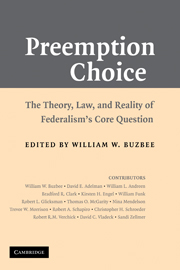Book contents
- Frontmatter
- Contents
- Contributors
- Acknowledgments
- Introduction
- Part I FEDERALISM THEORY, HISTORY, AND PREEMPTION VARIABLES
- 1 Preemption and Theories of Federalism
- 2 From Dualism to Polyphony
- 3 Preemption and Regulatory Failure Risks
- Part II THE LAYERED GOVERNMENT NORM
- Part III JUDICIAL TREATMENT AND INTERPRETIVE CHOICE
- Part IV PREEMPTION TALES FROM THE FIELD
- Index
1 - Preemption and Theories of Federalism
Published online by Cambridge University Press: 07 July 2009
- Frontmatter
- Contents
- Contributors
- Acknowledgments
- Introduction
- Part I FEDERALISM THEORY, HISTORY, AND PREEMPTION VARIABLES
- 1 Preemption and Theories of Federalism
- 2 From Dualism to Polyphony
- 3 Preemption and Regulatory Failure Risks
- Part II THE LAYERED GOVERNMENT NORM
- Part III JUDICIAL TREATMENT AND INTERPRETIVE CHOICE
- Part IV PREEMPTION TALES FROM THE FIELD
- Index
Summary
INTRODUCTION
American government is an experiment in redundancy, with powers and duties shared among federal, state, and local decision makers. The arrangement is designed to divide power, maximize self-rule, and foster innovation, but it also can breed confusion. In the areas of public safety and environmental protection, state and federal leaders (to name the two most active players in these disputes) are often seen jockeying for the inside track, hoping to secure the resources or authority needed to promote their views of the public good or gain politically. To outside observers, the best outcomes are not obvious. For example, should the federal government be the exclusive regulator of automobile pollution, as it is of automotive fuel efficiency, or should (as U.S. Senators from California successfully argued in 1967) California also be allowed to set its own unique, more stringent standards? Should New Jersey be able to issue regulations requiring chemical plant managers to consider safer technology to reduce the risks of terrorism incidents, or should those requirements be imposed only if the U.S. Department of Homeland Security allows them? Should state judges or juries be allowed to conclude, applying state tort law, that a pharmaceutical company has negligently failed to warn patients of drug side effects if the U.S. Food and Drug Administration has already approved the drug label? Deciding when federal law trumps state law can be a complicated process, involving the legislature, the judiciary, and even executive agencies. The guiding principles always include federalism.
- Type
- Chapter
- Information
- Preemption ChoiceThe Theory, Law, and Reality of Federalism's Core Question, pp. 13 - 32Publisher: Cambridge University PressPrint publication year: 2008



